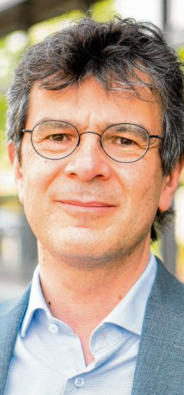From Ralph Sommer
More and more people are being vaccinated against the novel corona virus across Germany. But how long does this vaccination actually last? The Helmholtz Research Center in Wolgast has now started a large antibody study. A total of 8,000 volunteers are invited for this.
Wolgast. In the Postel Hotel in Wolgast, as many residents as possible from the Vorpommern-Greifswald district are to be examined for the presence of antibodies over the next few weeks. The Helmholtz Center for Infection Research based in Braunschweig started a study on Wednesday. “We have for it overall
8,000 test subjects were invited, who were randomly selected by the residents’ registration offices according to the prevailing age structure, says Braunschweig epidemiology professor Gérard Krause.
“We want to use antibodies to prove how the corona virus spreads.” The reporting procedures of the health authorities alone would not be sufficient for this, if only because not every infection is recognized. With the detection of antibodies, thanks to a new technology, it is also possible to understand what happened in the past. For example, it can be demonstrated whether the antibodies were formed as a result of an illness or as a reaction to a corona vaccination. It can also be seen which virus mutation triggered the formation of the antibodies.
According to team leader Angelika Rath, the tests run as follows: “We write to the test subjects and ask us to make an appointment for an examination at the Wolgast study center by telephone. After an informative discussion, a small questionnaire is filled out with the participants. Then a blood sample will be taken. ” In addition, the participants would receive a somewhat more extensive questionnaire that they could then fill out at home. After completing the examinations in three to four weeks, you will be informed in writing of the personal test results.
The scientific interpretation will take a little longer, says project manager Krause, who had already conducted comparable studies in Reutlingen, Freiburg, Aachen, Osnabrück, Magdeburg and Chemnitz since autumn 2020 and wants to conclude the study with a series of tests in Hanover from June. “For us, the examinations in the far north-east of Germany are particularly exciting because there is suspicion that the virus has been introduced across the Polish border and many people have already been vaccinated.”
The scientists hope that the study will enable them to draw conclusions about how effective the current vaccinations with the various vaccines are, how long the effect of the antibodies produced will last and when, at the latest, booster vaccinations will be required. The same applies to the defenses that have been activated by the body after a natural infection. So far, research has assumed that the protection lasts reliably for about six months.

The examinations are therefore very important for future vaccination strategies, which will probably have to take effect in autumn, says District Administrator Michael Sack (CDU). He therefore appealed to all residents, who will receive an invitation to this effect in the next few days, to take part if possible. According to the researchers, at least 3,000 of the 8,000 requested subjects would have to face the examinations in order to obtain reliable data.
Contact the author
r.sommer@nordkurier.de
Published in Nordkurier on the weekend, issue Saturday / Sunday, 15./16. May 2021
